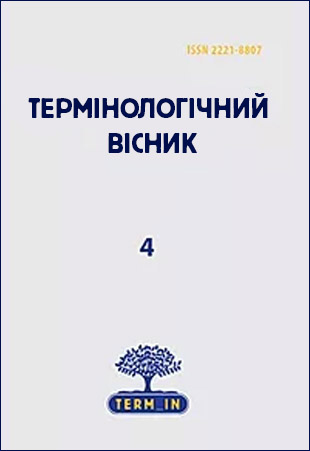Processes of Vocabulary Semantic Transformation in Ukrainian Media Space

Founders
National Academy of Sciences of Ukraine,
Institute of Ukrainian Language of NAS
Publisher
Institute of the Ukrainian Language of National Academy of Sciences of Ukraine
Scientific journal Ukrainian Language is registered by the Ministry of Justice of Ukraine as print media (Certificate: Series КВ № 12180 – 1064 ПР of January 12, 2007).
Included in the list of printed scientific specialized editions of Ukraine (Order of MES of Ukraine no528 from 12.05.2015)
Back side of the journal
Liudmyla Khalinovska
Information about the author:
Junior Researcher of Grammar and Scientific Terminology Department, Ukrainian Language Institute, National Academy of Sciences of Ukraine (Kyiv, Ukraine)
e-mail: halima@bigmir.net.
Title: Processes of Vocabulary Semantic Transformation in Ukrainian Media Space
Rubric: Branch Terminology
Abstract: The article deals with entry and active use of branch vocabulary and its semantic rethinking in modern information space (press, internet, television, author blogs, etc.). The spectrum usage of special vocabulary in contemporary periodicals is wide enough. There are a lot of well-known terms that journalists, TV presenters and bloggers like to use: аеропорт, термінал, літак etc., and brunch terms, that contain military segment полігон, блокада, міна, etc. A separate group in the media language consists of occasionalisms, which create pointedly and expressive characteristics of events, phenomena, realities, such as літакопад, пасажирство, майданбайтер.
There are a lot of terms from different disciplines in media language, which are used with various purposes – description of the events that take place in modern society, promotion of science, technology and inventions. There is reconsideration of vocabulary while atypical for terminological functioning, the term or phrase turns into the category of sustainable phrases and loses its original meaning. Such creations are often used with fully or partially changed meaning.
Original phrase semantic is lost and new value often expressive appears due to the unusual context usage and unusual interaction between the components. There is a semantic shift, which makes its new meaning.
Keywords: lexeme, term, term-phrase, in term function, occasionalism, metaphor.
References:
- Datsyshyn, Kh.P. (2001). Konotatyvnyi aspekt funktsionuvannia metafory v politychnomu dyskursi. Visnyk Lvivskoho un-tu. Seriia: Zhurnalistyka, Vyp. 22, 437–446 (in Ukr.).
- Zhovtobriukh, M.A. (1970). Mova ukrainskoi periodychnoi presy (kinets XX – pochatok XXI st.). Kyiv: Nauk. dumka (in Ukr.).
- Ivashchyshyn, O.M. (2013). Mistse terminolohichnoho slovospoluchennia v systemi movy. Inozemna filolohiia, Vyp. 125, 10–15. Retrieved from http://www.lnu.edu.ua/faculty/inomov.new/Foreign_Philology/ Foreign_Philology/Foreign_Philology_125/articles/2Ivashchyshyn.pdf
- Kolesnyk, H.M. (1982). Usno-rozmovne movlennia na shpaltakh hazety: vzaiemodiia usnoho i pysemnoho styliv movy. Kyiv: Nauk. dumka (in Ukr.).
- Kosmeda, T.A. (2013). Movna hra v paradyhmi interpretatyvnoi linhvistyky. Hramatyka otsinky. Hramatychna ihrema (teoretychne osmyslennia dyskursyvnoi praktyky) Drohobych: Kolo (in Ukr.).
- Pashynska, L.M. (2011). Frazeolohichni neolohizmy u suchasnomu ukrainskomu mas-mediinomu dyskursi [Synopsis of PhD thesis]. Kyiv (in Ukr.).
- Ponomariv, O.D. (2000). Stylistyka suchasnoi ukrainskoi movy. Kyiv: Lybid (in Ukr.).
- Serbenska, O.A. (1989). Mova presy v konteksti vymoh perebudovy: navch. posibnyk. Kyiv: UMK VO pry Minvuzi URSR (in Ukr.).
- Serbenska, O.A. (1976). Naukovo-tekhnichnyi termin u movi suchasnoi hazetnoi publitsystyky. Tezy respublikanskoi nauk. konf. z problemy “naukovo-tekhnichnyi prohres i mova” (Zhytomyr, 1976) (pp. 135–137). Zhytomyr (in Ukr.).
- Skovronska, I.Yu. (2012). Frazeolohichni novotvory, yavyshche transformatsii u presi ukrainskoi diaspory SShA i Kanady. Tele- ta radiozhurnalistyka, Vyp. 11, 69–74. Retrieved from: journ.lnu.edu.ua/vypusk7/n11/tv11-14.pdf.
- 1Styshov, O.A. (2005). Ukrainska leksyka kintsia XX stolittia (na materiali movy zasobiv masovoi informatsii). Kyiv: Puhach (in Ukr.).
- Taran, A.A. (2011). Konkuruvannia nominatsii u suchasnii ukrainskii literaturnii movi: tendentsii stabilizatsii novoi leksyky. Cherkasy: Vydavets Yu. Chabanenko (in Ukr.).
- Taranenko, O.O. Metafora. In n Ukrainska mova : Entsyklopediia (pp. 292). Kyiv: Vyd-vo “Ukr. entsykl.” im. M. P. Bazhana (in Ukr.).
- Chadiuk, O.M. (2005). Metafora u sferi suchasnoi ukrainskoi politychnoi komunikatsii [Synopsis of PhD thesis]. Kyiv: In-t ukrainskoi movy NAN Ukrainy (in Ukr.).
Legends
Babaka, V.P. (Ed.) (2004). Rosiisko-ukrainskyi slovnyk aviatsiinykh terminiv (Vol. 1–2) Kyiv: Tekhnika (in Ukr.).
Verkhulevska, L.F et al. (2007). Tlumachnyi slovnyk aviatsiinykh terminiv. Kyiv: NAU (in Ukr.).


